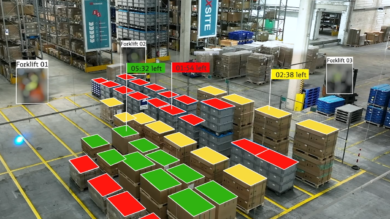Trying to introduce innovative ideas in a large organization sometimes feels like trying to change the course of a huge ocean liner – it takes a lot of time and constant steering. When it comes to start-up management in logistics, experts from various management consultancies agree on the disruptive changes that are expected soon in the industry.
It is predicted, for example by Roland Berger, that innovative concepts for freight tech in intelligence, automation and integration will increase transparency and efficiency within the logistics industry. As in a lot of other industries, one can see that established, more traditional companies sometimes hesitate to tackle innovative concepts.
Therefore, it is of growing importance to work closer with start-ups to stay competitive, not lose ground and start something big. But what is the best and most effective way to work with start-ups? How is it best to change the course of the ocean liner?

Development of start-up market in logistics
When it comes to large corporations, not only does the concept of ‘size equals strength’ not fit anymore but the competition for start-ups has also increased tremendously. Since 2014, the total funding in logistics start-ups has seen a dramatic increase, growing at 76 percent per year. The funding volume growth in logistics start-ups has outpaced overall venture growth, as shown by the latest McKinsey study ‘Startup funding in logistics‘.
“The biggest question of our time is not “Can it be built?” but “Should it be built?”. This places us in an unusual historical moment: our future prosperity depends on the quality of our collective imaginations.”
The study additionally shows that funding is highly concentrated: the ten best-funded companies have received about 46 percent of total funding – similar to other industries. The ranking of the funding volume by region has changed: In 2014, the US had the largest share (54 percent in 2014 compared to 35 percent in 2019), while in 2019, China had the largest share (19 percent in 2014 compared to 40 percent in 2019). Europe accounted for a disproportionally small share in 2019, with just 5 percent.
In companies, innovative ideas often come from external sources and are not only generated internally – as identified by many logistics service providers. Direct investments into start-ups is one option, but pure money transfers is not the most promising move for an ocean liner to change direction.
Partnerships with start-ups as a campaign of movement
DB Schenker, for example, has actively chosen a different route to drive movement and growth. The global logistics provider sees itself as a partner and believes that start-up management in logistics offers unique opportunities for both sides to learn, develop and grow together.
“We can offer insights and real environment feedback to start-up solutions through the exchanges with subject matter experts and proof of concept. We also offer them scaling opportunities globally. At the same time, start-ups become a valuable source of new ideas, opportunities and benchmarks for the future of our company.”
During collaboration with start-ups, DB Schenker emphasizes that it is a partnership and not simply the copying of ideas. For start-ups with whom a unique strategic fit is found, DB Schenker occasionally offers investments through lean cooperation with corporate venture capital DB Digital Ventures.
Together with other mavericks in the industry, DB Schenker is bringing logistics to the third dimension: heavy lift cargo drones with Volocopter; automized warehouse operations to ensure operational excellence with Gideon Brothers; and productivity, improved navigation and precise customer deliveries with what3words – to name just a few examples.

Challenges for successful collaboration
In traditional companies, it is common to see push backs from change and innovation. It is true that not all partnerships with start-ups will lead to success. But one can only find out by testing promising ideas in the real world. Such a partnership approach can be one way to show an ocean liner the joy of changing direction.
When a large corporation partners with a start-up, it is often necessary to build a bridge between the different cultures. While start-ups believe in trial and error, established companies prefer to analyze and discuss ideas before acting. A solution could be to develop new forms of corporate entrepreneurship by using agile leadership structures or develop a new cultural mindset by establishing a fault tolerance that could welcome opportunities and reduce analysis at the beginning.
Furthermore, innovations might need agile teams instead of hierarchical structures to come to life. An outside-in perspective and putting the customer at the center of all activities could also help. In addition, a lot of corporations tend to think in silos, but most start-ups need an entrepreneurial spirit to give rise to their innovative ideas.
Starting the engines
Partnerships can offer corporations promising opportunities, but it will not always be an easy journey. Only by working together will it be possible to discover new solutions on the way to the future of logistics. Start-up management in logistics could be the start of something truly great and a new direction for the ocean liner!
Published: December 2020










